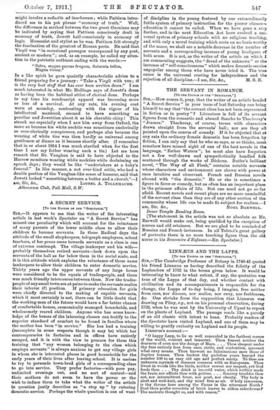THE SERVANT IN ROMANCE.
[To TM EDITOR Or THE •' SPECTATOR."] Sts,—How comes it, pray, that the writer of an article headed " A Secret Service " in your issue of last Saturday can bring himself to say that "the servant class has not been represented. in fiction or in poetry " ? Literature is full of its servant figures from the romantic and absurd Sancho to Thackeray's " Jeames." Thackeray, of course, teems with characters drawn straight from the servants' hall; nor are they all painted upon the canvas of comedy. If it be objected that at any rate the ordinary female domestic has been forgotten by fiction, I can only say that he who so says, or so thinks, must somehow have missed sight of one of the best novels in the language, "Esther Waters "; he must also have forgotten not a few well-drawn and sympathetically handled folk scattered through the works of Dickens. Butler's brilliant novel, "The Way of all Flesh," contains notable servants whose characters and environment are shown with power at once intuitive and observant. French and Russian novel' abound with " the domestic." He or she is sometimes a figure in farce or comedy, but as often has an important place in the grimmer affairs of life. But one need not go so far afield. Recent novels and recent plays are no more unmindful of the servant class than they are of any other section of the community whose life can be made fit subject for realism.—I
am, Sir, &c., NOEL BARWELL. Inner Temple Beading Boom.
[The statement in the article was not so absolute as Mr. Harwell would make out, being qualified by the exception of nurses and old retainers. But we are glad to be reminded of Russian and French instances. In all Tolstoi's great gallery of portraits there is no more touching figure than the old nurse in his Souvenirs d'Enfance.—ED. Spectator.?






























































 Previous page
Previous page